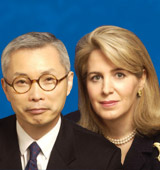What prompted triggered this pioneering work? What were the roots of this extensive research?
This journey began 20 years ago by
asking a simple question: is there an
underlying strategic logic behind
breakthrough growth? We have
always shared an intellectual
curiosity to understand what it takes
to stand apart and create strong
profitable growth. In search for an
answer, we looked back more than
100 years and across more than 30
industries. We asked which
industries exist today that were
prominent in 1900? It turns out that
apart from the basic industries such
as cars and steel there were very few
other industries. The big growth
industries in the past 30 years have
been the computer industry,
software, gas fired electricity plants,
cell phones and the cafe bar concept,
for example. But in 1970, not one of
those industries existed in a
meaningful way, and thats just 37
years back. The pattern continues as
you dig into the past. We have a
hugely underestimated capacity to
create new industries. It is commonly
assumed that the number of
industries stays the same over time,but it doesnot. And if this is where the
bulk of wealth has been created,
shouldnot the field of strategy
systematically explore and
understand the path to new market
space creation, what we call blue
oceans.
While our analysis did not reveal any
permanently great companies or
industries, what we did find is that
companies, like industries, rise and
fall based on the strategic moves they
make. And the strategic move that we
foundmatters centrally is the creation
and capturing of new market space.
In industry after industry we
observed high performing companies
did not compete but made the
competition irrelevant. They were not
focused on benchmarking
competitors and striving to beat them.
Instead of accepting industry
conditions, they challenged them and
created new demand, or blue oceans.
These insights did not square with
the red ocean paradigm which views
industry conditions and demand as
beyond a companys influence. The
current strategy paradigm failed to
explain how to create and capture
this lucrative and growing part of the
market universe.
We continued to work to understand
this pattern by which blue oceans are
created and captured, and high
performance is achieved. We found
that those that sought to create blue
oceans did not follow conventional
strategic logic; instead they pursued a
different strategic logic that we call
value innovation the simultaneous
pursuit of differentiation and low
cost. Once we identified the strategic
logic, then we set our sights on
developing a set of tools and
methodologies to support our thesis.
It is one thing to say that there is
untapped market space devoid of any
competition, but it is another thing to
have practical tools and
methodologies to create blue oceans.
We studied companies around the world and developed practical
methodologies in the quest of blue
oceans. We then applied and tested
these tools and frameworks in action
by working with companies in their
pursuit of blue oceans, enriching and
refining them in the process.
-
What if any, according to you were
the most defining moments and
satisfying moments of your longdrawn
research effort?
The journey of academic research is
filled with hard work, intellectual
struggles and endless discussions on
issues. This journey can be
frustrating at times, especially when
your hypothesis ends up being
different than your findings and you
have to start over again. In taking such
a long and tedious journey of
painstaking research, you find that
support and friendship are very
important. In fact, without that it is
very difficult to sustain your
momentum. Therefore, this has been
a 20-year effort, first and foremost
about friendship, about loyalty, about
believing in one another. It was
because of that friendship, and that
belief, that we set out on the journey
to explore the ideas in Blue Ocean
Strategy and eventually came to write
it. So, to be honest, everyday that we
work together is more rewarding and
satisfying than the last.
